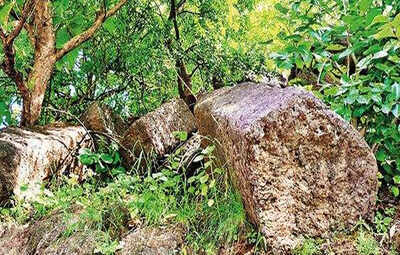Top Searches
- News
- City News
- Hyderabad News
- Telangana: 6.5 crore-year-old basalt columns discovered in Adilabad forest
Telangana: 6.5 crore-year-old basalt columns discovered in Adilabad forest

According to geologists, the basalt columns were formed in Deccan plateau due to volcanic eruptions around 65 million years ago
HYDERABAD: Rare basalt columns, estimated to be over 6.5 crore years old, were discovered by a group of history enthusiasts in Bazar Hatnur forests of Adilabad district in Telangana. Geologists said that basalt columns were formed in the Deccan plateau due to volcanic eruptions some 65 million years ago. These rock formations are found in the southern and southeastern parts of Telangana in Rangareddy, Medak, Nizamabad and Adilabad districts.
Kotta Telangana Charitra group members reported that ‘basalt columns’ were widely found in the reserve forests in Adilabad. Historian Sriramoju Haragopal said, “Similar formations were found earlier in Kolhapur in Maharashtra. Deccan Traps are one of the most significant volcanic features on the earth. Basaltic rocks consist of polygonal patterns and columnar joints. There are 6.5 crore years old.”
Former deputy director-general, Geological Survey of India, Chakilam Venugopal said: “The thick pile of volcanic flows, widely spread in the west coast and Deccan plateau, is commonly known as Deccan Traps. These traps, spread as thin sheets of basic lava erupted from fissures, occur as flat-topped mountains all over the states of Maharashtra, parts of Madhya Pradesh, Gujarat, Karnataka and Telangana. Towards the west and central part of the Deccan main mass, the flows are thick and rapidly erupted .On the southern margin and eastern fringes, they are less in number and not rapidly erupted, allowed the formation of inter trappean.”
These lava flows, at places, developed polygonal cracks at the stage of solidification and these cracks vertically extended, forming interlocking columns are eventually exposed to weathering, resulting in uniquely patterned columnar patterns to the area. These columnar basalts sometimes appear as man-made features due to the imposing columnar patterns.
In India, such columnar basalts are known to occur at St Mary’s Island (Udipi, Karnataka), Andheri (Mumbai) and Kolhapur (both in Maharashtra). The columnar basalt of St Mary’s Island has been declared a national geological monument.
“The southeastern margin of Deccan Traps extend to Telangana all along Maharashtra border. Columnar basalt are, however, not known in this area. The recorded columnar basalt from Adilabad appears to be a new record,” Venugopal said.
Kotta Telangana Charitra group members reported that ‘basalt columns’ were widely found in the reserve forests in Adilabad. Historian Sriramoju Haragopal said, “Similar formations were found earlier in Kolhapur in Maharashtra. Deccan Traps are one of the most significant volcanic features on the earth. Basaltic rocks consist of polygonal patterns and columnar joints. There are 6.5 crore years old.”
Former deputy director-general, Geological Survey of India, Chakilam Venugopal said: “The thick pile of volcanic flows, widely spread in the west coast and Deccan plateau, is commonly known as Deccan Traps. These traps, spread as thin sheets of basic lava erupted from fissures, occur as flat-topped mountains all over the states of Maharashtra, parts of Madhya Pradesh, Gujarat, Karnataka and Telangana. Towards the west and central part of the Deccan main mass, the flows are thick and rapidly erupted .On the southern margin and eastern fringes, they are less in number and not rapidly erupted, allowed the formation of inter trappean.”
These lava flows, at places, developed polygonal cracks at the stage of solidification and these cracks vertically extended, forming interlocking columns are eventually exposed to weathering, resulting in uniquely patterned columnar patterns to the area. These columnar basalts sometimes appear as man-made features due to the imposing columnar patterns.
In India, such columnar basalts are known to occur at St Mary’s Island (Udipi, Karnataka), Andheri (Mumbai) and Kolhapur (both in Maharashtra). The columnar basalt of St Mary’s Island has been declared a national geological monument.
“The southeastern margin of Deccan Traps extend to Telangana all along Maharashtra border. Columnar basalt are, however, not known in this area. The recorded columnar basalt from Adilabad appears to be a new record,” Venugopal said.
FacebookTwitterLinkedinEMail
Start a Conversation
end of article

